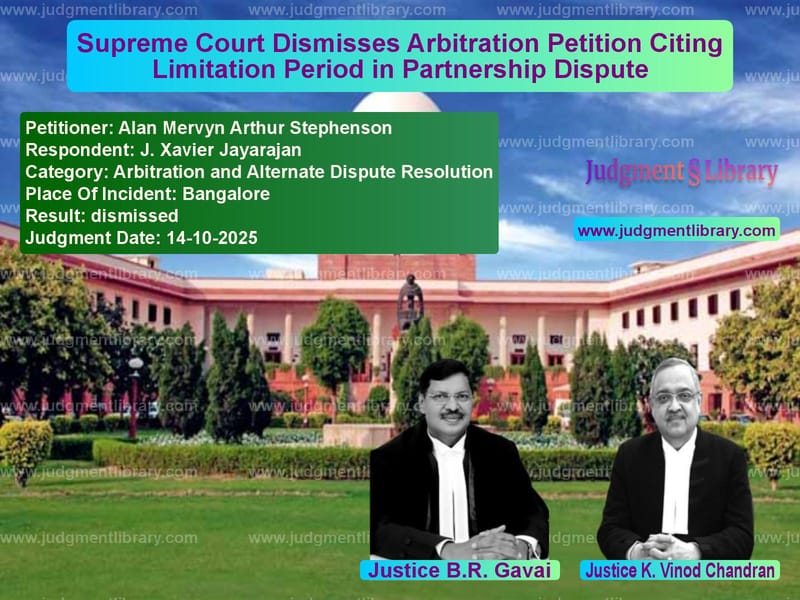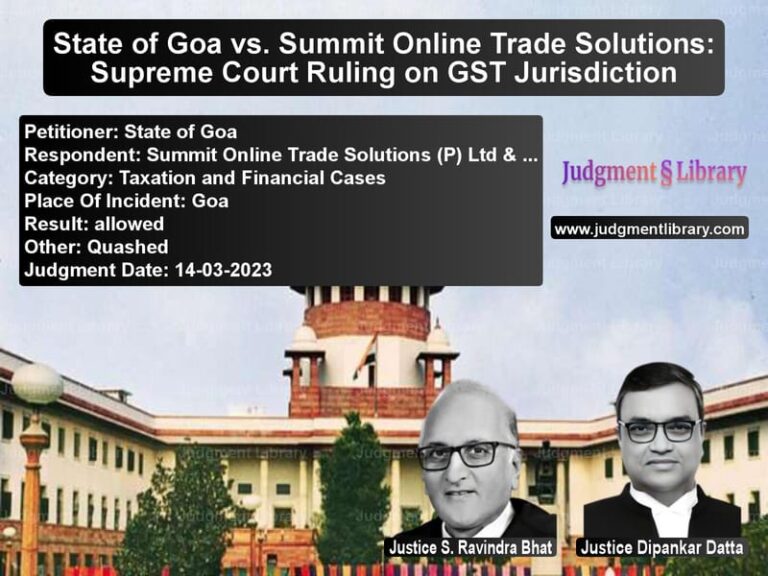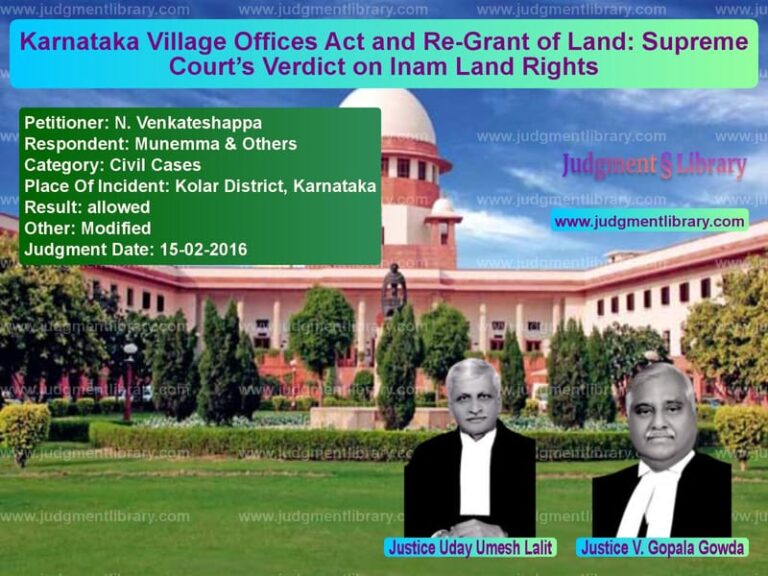Supreme Court Dismisses Arbitration Petition Citing Limitation Period in Partnership Dispute
In a significant ruling that underscores the importance of timely legal action, the Supreme Court of India has dismissed an arbitration petition filed by a UK-based petitioner, holding that the claim was hopelessly barred by limitation. The judgment, delivered on October 14, 2025, by a bench comprising Chief Justice B.R. Gavai and Justice K. Vinod Chandran, provides crucial clarity on how limitation periods apply to arbitration proceedings and serves as a stark reminder to parties about the consequences of delayed legal action.
The case involved a complex partnership dispute between Alan Mervyn Arthur Stephenson, residing in the United Kingdom, and J. Xavier Jayarajan, concerning a real estate business partnership. The legal battle had its roots in multiple partnership agreements spanning several years, with the core dispute revolving around alleged non-payment of profits from a property transaction.
The Partnership Background
The Court noted the historical context of the partnership arrangements: ‘The brief fact to be noticed is that the partnership was entered into by the petitioner’s sister and the respondent on 10.04.2008 with the objective of engaging in a real estate business; inter alia of construction of service apartments. The business was carried on, according to the respondent, with the active involvement of the petitioner, the brother of one of the partners. Later, the said partnership was dissolved on 22.12.2008. Both parties admit that a new partnership was entered into between the petitioner and the respondent on 20.09.2014.’
The petitioner’s claim centered around substantial financial contributions made to the partnership: ‘The petitioner alleges that substantial amounts were paid by him amounting to Rs.2,31,85,600/-, on the strength of Clause 6 of the Partnership Agreement which obligated 75% of the profits to be transferred to the petitioner, nothing was done in the property purchased on 04.05.2016.’
The Limitation Challenge
The respondent’s primary defense against the arbitration petition was the limitation period. The Court meticulously examined the timeline of events to determine whether the claim was time-barred: ‘Admittedly, the purchase of the land alleged, was on 04.05.2016 and as per the notice dated 09.12.2020 produced as per the Annexure P-1, the amounts were paid before the said date. As on the date of notice, hence the claim for recovery of amounts was barred by limitation.’
The Court further noted the petitioner’s own admissions in the arbitration request: ‘It is also pertinent that the petitioner, in their arbitration request itself, admits that on 06.05.2017, a Police Complaint was raised before the Police Commissioner, Bangalore against the respondent for fraud and cheating. This complaint obviously was closed since the petitioner had approached the Chief Metropolitan Magistrate, Mayohall at Bangalore under Section 200 of the Criminal Procedure Code, 1973, which stood rejected on 16.06.2017.’
Even when considering the most recent possible date for computing limitation, the Court found the claim barred: ‘After the recital of the above facts, the petitioner in the arbitration request speaks of the receipt of payment of Rs. 1 lakh on 04.08.2017. Even if limitation is computed from the said date, the claim stands barred on 09.12.2020, when the notice was issued seeking appointment of arbitrator.’
Procedural Delays and Their Consequences
The Supreme Court highlighted multiple procedural delays that further weakened the petitioner’s case. The judgment noted: ‘The Counter Affidavit of the respondent also speaks of a delayed challenge having been made to the order of the Magistrate after about a year which was also rejected by the Sessions Judge for reason of no explanation having been offered for the delay of 234 days.’
The Court also pointed out the significant gap between the initial notice and the actual arbitration request: ‘Even after the notice issued on 09.12.2020, the arbitration request was first made before the High Court of Karnataka at Bengaluru on 22.06.2022 which remained in that Court till 20.01.2025, when the same was disposed of leaving liberty to take appropriate remedies. Relying on it, the petitioner filed the current petition. It goes without saying even the notice of arbitration was delayed and barred by limitation and the arbitration request itself was made two years after the initial notice.’
The Legal Framework and Final Ruling
The petition was filed under Section 11(5) of the Arbitration and Conciliation Act, 1996, which deals with the appointment of arbitrators. However, the Court emphasized that even in arbitration proceedings, the fundamental principles of limitation law apply. The Limitation Act, 1963, prescribes specific time periods within which different types of legal actions must be initiated, and failure to comply with these timelines can result in the claim being time-barred.
In this case, the Court found that regardless of which date was considered as the starting point for limitation – whether the property purchase date of May 4, 2016, the police complaint date of May 6, 2017, or the alleged payment receipt date of August 4, 2017 – the arbitration notice issued on December 9, 2020, fell beyond the permissible three-year limitation period for such claims.
The Supreme Court’s final ruling was unequivocal: ‘The Arbitration Petition seeking appointment of arbitrator stands dismissed.’
Broader Implications
This judgment serves as an important precedent in arbitration law, reinforcing that arbitration is not an escape route from limitation requirements. The Court’s decision underscores that parties seeking to invoke arbitration clauses must do so within the statutory limitation periods, just as they would for conventional litigation.
The ruling also highlights the importance of maintaining proper documentation and taking timely legal action in commercial disputes. For businesses and individuals engaged in partnerships or other commercial arrangements, this case emphasizes the need for vigilance in monitoring contractual obligations and promptly addressing any breaches.
Furthermore, the judgment demonstrates the Supreme Court’s approach to handling arbitration petitions under Section 11 of the Arbitration Act. While courts generally adopt a prima facie examination approach at the appointment stage, they will not hesitate to dismiss petitions where the claim is manifestly and indisputably time-barred.
This decision also has international implications, particularly for non-resident Indians and foreign parties involved in Indian commercial disputes. It sends a clear message that geographical distance or cross-border complexities cannot justify delays in pursuing legal remedies.
The Supreme Court’s dismissal of the arbitration petition based on limitation grounds reinforces the legal principle that delay defeats equity. It serves as a cautionary tale for all parties involved in commercial disputes to be proactive in protecting their legal rights and to seek timely resolution of their claims through appropriate legal channels.
Petitioner Name: Alan Mervyn Arthur Stephenson.Respondent Name: J. Xavier Jayarajan.Judgment By: Justice B.R. Gavai, Justice K. Vinod Chandran.Place Of Incident: Bangalore.Judgment Date: 14-10-2025.Result: dismissed.
Don’t miss out on the full details! Download the complete judgment in PDF format below and gain valuable insights instantly!
Download Judgment: alan-mervyn-arthur-s-vs-j.-xavier-jayarajan-supreme-court-of-india-judgment-dated-14-10-2025.pdf
Directly Download Judgment: Directly download this Judgment
See all petitions in Arbitration Awards
See all petitions in Arbitration Act
See all petitions in Commercial Arbitration
See all petitions in Enforcement of Awards
See all petitions in Judgment by B R Gavai
See all petitions in Judgment by K. Vinod Chandran
See all petitions in dismissed
See all petitions in supreme court of India judgments October 2025
See all petitions in 2025 judgments
See all posts in Arbitration and Alternate Dispute Resolution Category
See all allowed petitions in Arbitration and Alternate Dispute Resolution Category
See all Dismissed petitions in Arbitration and Alternate Dispute Resolution Category
See all partially allowed petitions in Arbitration and Alternate Dispute Resolution Category







